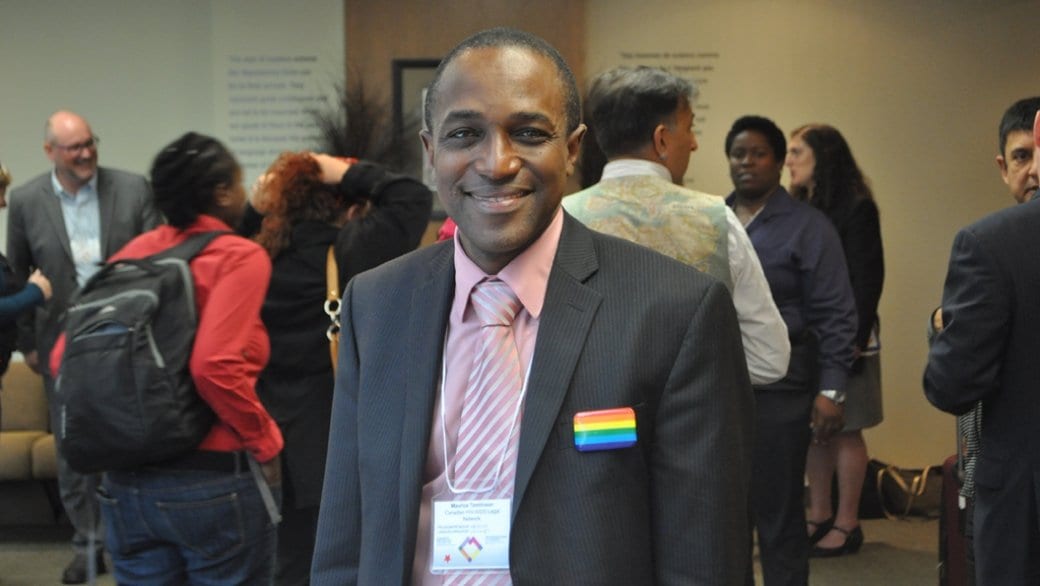A coalition of LGBT activists is asking the Canadian government for a cohesive strategy to support gender and sexual minorities abroad.
“There is a tremendous opportunity for Canadian civil society [. . .] to work with the Canadian government on how to really move Canada into a smart, leadership role in supporting the human rights of LGBT people around the world,” says Doug Kerr, head of the Dignity Initiative.
The Dignity Initiative was formed after the 2014 World Pride in Toronto, and aims to connect existing human rights organizations from around the country.
Following a two-day conference in Ottawa, the coalition of dozens of groups published a report on June 2, 2016. The report details what both the federal government and civil-society groups are doing for LGBT minorities abroad, and how Canada compares with countries.
The coalition says to avoid “speaking out without engaging with local activists or understanding the local context” as one of its recommendations for government.
In 2012, then-foreign affairs minister John Baird openly disparaged Uganda’s visiting parliamentary speaker over her country’s proposed anti-gay bill. While the move was hailed in Ottawa, an activist who has since immigrated to Canada recalls an ugly response back in Uganda.
“There was a lot of anger, lots of protests and lots of support from the Christian fundamentalists,” activist Junic Wambya says. The speaker returned to Uganda with a crowd of support at the airport, and fast-tracked the anti-gay bill, which had little attention beforehand.
“If we can use diplomacy, and use the local activists to do the work, it will not be seen as if the West is imposing.”
In a similar vein, a Jamaican lawyer who now lives in Toronto says Canada must stop “exporting homophobia.” Canada has sometimes supported development charities run by religious groups that advocate against homosexuality.
“We have to have religious leaders understand the impact their words are having on the global south,” says Maurice Tomlinson, a senior policy analyst for the Canadian HIV/AIDS Legal Network.
Tomlinson says Canadian groups should leverage their diasporic communities to push for rights abroad. His organization has givensensitivity training to police officers in the Caribbean, is co-ordinating a Jamaican LGBT homeless shelter modelled off of Toronto’s, and has challenged Jamaica’s buggery law in court.
“We’re working with diaspora groups, in Canada and elsewhere, to get them to know how to best assist the liberation movement back home.”
Karlene Williams-Clarke, who leads newcomer services for The 519, Toronto’s LGBT community centre, says Canada should make its refugee system more accommodating to LGBT people.
“I admire the system in Holland,” she says, noting that the Netherlands streamlines LGBT claims and seldom asks for documentation from people who have tried to hide their sexuality. “They provide stable housing for their refugees, they work with them in helping to develop skills and give them that kind of safety.”
The Dignity Initiative’s report also hails the Netherlands’ Shelter City Initiative, which welcomes human-rights activists who don’t qualify as refugees for three-month terms in order to network and plan a safe living situation back home.
The coalition also calls on shorter wait times for LGBT refugees. Wambya says some queer people wait two years to come to Canada, even when their application has been expedited.
“The rest of the inmates in those refugee camps will identify them as LGBT people, and then they face lots of violence,” she says. “We’ve heard stories where people have had to run away from refugee camps and go on the streets to do sex work in order to survive.”
The reports note a huge discrepancy among Canada’s work in other countries. Some embassies offer safe meeting spaces for LGBT activists, and Canada’s outreach in Vietnam was key to enshrining rights for trans people — but other Canadian posts abroad offer virtually no support for LGBT people.
The coalition suggests Canada follow Britain, which published a strategy in February to incorporate LGBT people into all of its development work, instead of Canada’s current patchwork of “short-term, one-off funds.”
The Diginity Initiative is planning to look at whether Canada is doing more for LGBT people abroad at a Montreal human rights conference in August 2017 as part of Canada Pride.

 Why you can trust Xtra
Why you can trust Xtra


